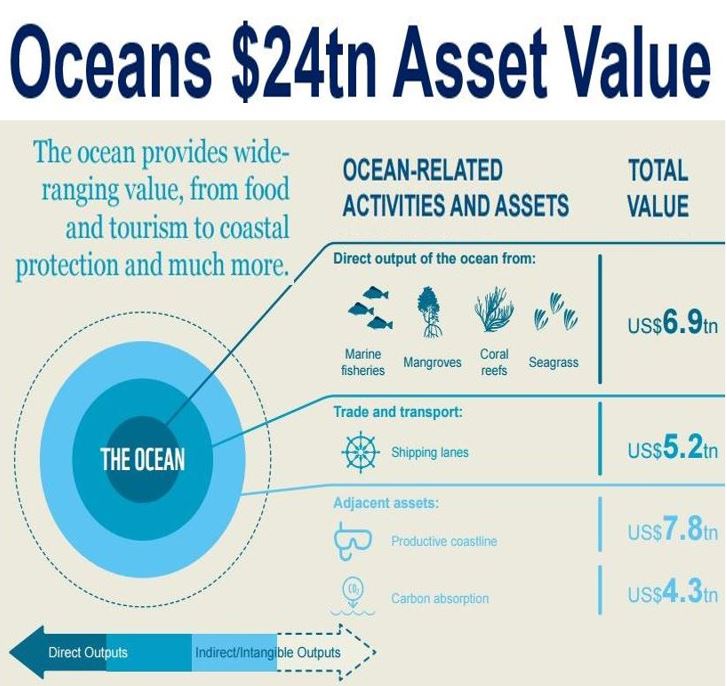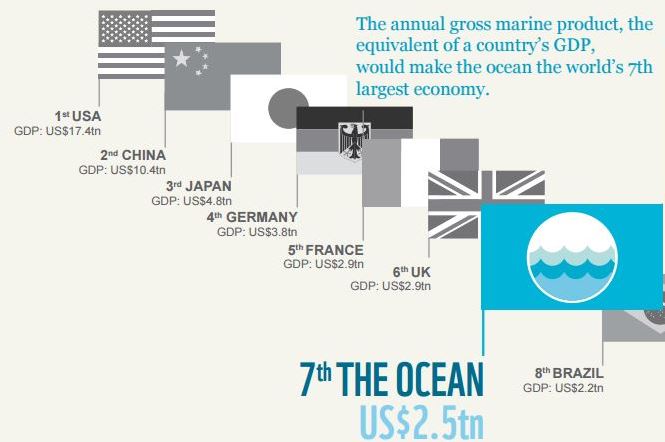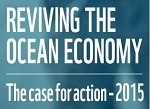The World Wildlife Fund (WWF) says the world’s oceans are worth at least $24 trillion, but their resources are rapidly eroding. In a new report – Reviving the Ocean Economy: The Case for Action 2015 – the WWF says that the world’s oceans, which are economic powerhouses, are moving towards collapse unless urgent global action is taken.
If the oceans were ranked next to the top economies in the world, they would rank number 7 in annual value of goods and services ($2.5 trillion), biting at the heels of the UK.
The WWF likens the neglect of our oceans to not investing in a fund that yielded 10% per year.

If we continue neglecting our oceans, we will lose a colossal asset, says the WWF. (Image: WWF)
Three key solutions required
The report authors, who worked with The Boston Consulting Group and the Global Change Institute at the University of Queensland, say three key solutions are required:
1. Embedding ocean recovery through the United Nation’s Sustainable Development Goals.
2. Taking action worldwide to combat climate change.
3. Making good on pledges to deliver well-managed coastal and marine protected areas.
The report reveals our oceans’ vast wealth through assessments of goods and services ranging from coastal storm protection to fisheries. It also describes a relentless assault on its resources through climate change, misuse and over-exploitation.
CEO of WWF-UK, David Nussbaum, said:
“Our oceans are a climate regulator and carbon sink, supporting future global economic growth, as well as providing critical goods and services that underpin the well-being of billions of people. But rising temperatures and increased acidification put all this at risk.”
“We should recognise the role our oceans play as an important business asset that requires sustainable management and investment – and governments should fully support and implement the UN Sustainable Development Goal on the ocean.”

The world’s oceans would appear in the top ten economies if their gross marine product were translated to GDP. (Image: WWF)
Oceans’ health linked to economic value
More than two-thirds of the oceans’ annual value depend on healthy conditions to maintain their economic output, the authors explain. As seagrass and corals disappear, fisheries collapse and mangroves are deforested, the marine economic engine that secures the lives and livelihoods across the planet is under serious threat.
Douglas Beal, Partner and Managing Director at The Boston Consulting Group, said:
“Being able to quantify both the annual and asset value of the world’s oceans shows us what’s at stake in hard numbers; economically and environmentally.”
“We hope this serves as a call for business leaders and policymakers to make wiser, more calculated decisions when it comes to shaping the future of our collective ocean economy.”
Our oceans are changing more rapidly today than at any other point in millions of years, the report points out.
How will we (and the ocean) cope as the world’s human population grows alongside its reliance on the sea? Restoring the ocean economy and its core assets is a matter of worldwide urgency.
Oceans are reaching the tipping point
Lead author, Ove Hoegh-Guldberg, Director of the Global Change Institute in Australia’s University of Queensland, said:
“The ocean is at greater risk now than at any other time in recorded history. We are pulling out too many fish, dumping in too many pollutants, and warming and acidifying the ocean to a point that essential natural systems will simply stop functioning.”
One of the main causes of the ocean’s declining health is climate change. The report quotes studies showing that at the current rate of warming, coral reefs that provide food, jobs and storm protection to hundreds of millions of humans will vanish completely by the middle of this century.
Climate change is also making the ocean more acidic, something that will take “hundreds of human generations for the oceans to repair.”
Ninety percent of our oceans’ fish stocks are either fully- or over-exploited. For example, the Pacific Bluefin tuna population has declined by 96% from unfished levels.
Dr. Lyndsey Dodds, who heads WWF-UK’s Marine Policy, said:
“From a UK perspective, our government must recognise the value of our seas and ensure their protection, starting with swift designation of the next tranche of Marine Conservation Zones.”
“These zones – along with other measures – such as improved fisheries management – are essential to safeguard the marine assets that underpin the UK economy.”
We have not yet crossed the line, i.e. it is not too late. There is still time to reverse the troubling trends and restore our oceans to full health, so that they can benefit people, business and nature.

Reviving the Ocean Economy puts forward an eight-point action plan that would restore resources to their full potential.
A study published in February informed that we dumped around 8 million tons of plastic debris into the world’s oceans in 2010, a figure that will likely increase more than tenfold within the next decade.
Citation: “Reviving the Ocean Economy – The case for action 2015,” Professor Ove Hoegh-Guldberg et al. WWF International, Gland, Switzerland., Geneva, 60 pp.

